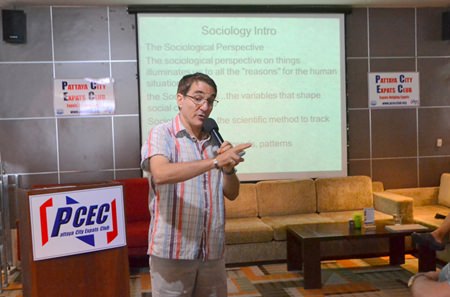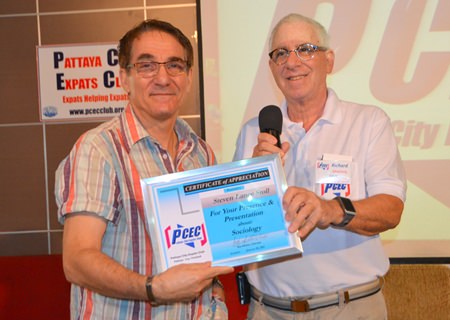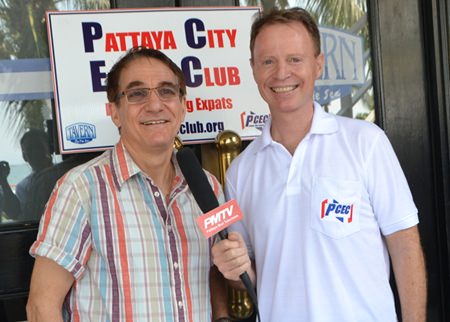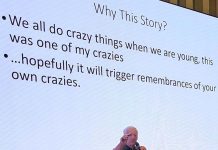Race is not about genetics; it is a social construct. Until about 570 years ago, the idea of race did not exist. These were some of the ideas advanced by Steven Lance Stoll, a sociologist, who gave a fast-paced and at times provocative presentation to the Pattaya City Expats Club on Sunday, January 18.
Steven Lance Stoll is a former Adjunct Professor of Social Sciences teaching Sociology at several colleges in the Jacksonville, Florida area until May 2014. He presently is teaching English in Chonburi.
 Steven Lance Stoll tells his PCEC audience about the field of Sociology before presenting some very thought provoking issues on the subject of racism and how it came about.
Steven Lance Stoll tells his PCEC audience about the field of Sociology before presenting some very thought provoking issues on the subject of racism and how it came about.
Before he got on his primary topic of racism, Steven talked about sociology more generally. He defined sociology as “the systematic study of the groups and societies in which people live, how social structures and cultures are created and maintained or changed and how they affect our behaviour.”
Steven said that one of the basic characteristics of sociology is that it doesn’t see things as one-dimensional. Human beings are multi-faceted. Societal problems are multi-faceted. “If a black man in America can’t get a job, can we automatically conclude that it is because of racism?” His answer was “No” as there could be several factors involved; perhaps the man is over 50 or he has psychological problems.
 MC Richard Silverberg presents the PCEC Certificate of Appreciation to Steven Lance Stoll for his fast-paced and at times provocative presentation.
MC Richard Silverberg presents the PCEC Certificate of Appreciation to Steven Lance Stoll for his fast-paced and at times provocative presentation.
Sociology is interested in social forces: the variables, trends and patterns that shape the social climate. Sociologists use scientific methods to track these forces. But because sociology deals with people and with forces that are less precise (and therefore harder to measure) than, say, chemistry, it is often not seen as a science, Steven explained. Sociology deals with human variation. Sociologists are interested in values and attitudes. Further, the structure of society affects people’s attitudes and behaviours.
 Ren Lexander interviews Steven Lance Stoll for Pattaya Mail TV about his presentation to the PCEC. It can be seen on You Tube: https://www.youtube.com/watch?v=s1QzvXL3zDY
Ren Lexander interviews Steven Lance Stoll for Pattaya Mail TV about his presentation to the PCEC. It can be seen on You Tube: https://www.youtube.com/watch?v=s1QzvXL3zDY
Steven said that humans are a single species. Homo sapiens have been around for 180,000 years. That is too short a period to be able to say that that what we view as different races is a phenomenon caused by genetics. Steven explained that race is a category of people who see themselves, and are seen by others, as different because of characteristics that are assumed to be innate and biologically inherited. Racism is the belief that another group is innately inferior to one’s own, Steven said. Racism can be hatred for another group even without the belief in inferiority.
We all came from Africa. Steven explained that the people who moved from Africa to Europe found animals that could be domesticated like cows and sheep. So, they became successful farmers and ranchers instead of hunter gathers, which is why European societies advanced; it wasn’t because Europeans were a different or a better “race.” Because they were further away from the sun, the skins of Europeans became lighter. Then, Steven said, came colonialism by Europeans which began “raping” the world; they defined certain darker skinned people as inferior; racism and colonialism went hand in hand.
 Attendees at the PCEC Sunday meeting pick up their free copy of Pattaya Mail, which is available at the end of the meeting.
Attendees at the PCEC Sunday meeting pick up their free copy of Pattaya Mail, which is available at the end of the meeting.
In Steven’s opinion, breeding was part of slavery. People were bred to be strong, muscular slaves, not brain surgeons. The repercussions of this breeding extend through to today; it explains why a very high percentage of the professional basketball and football players in the U.S. are black. What is the difference between race and ethnicity? Steven said that an ethnic group is a category of people who see themselves and are seen by others as set apart because of cultural heritage or language. There are 150 distinct ethnic and racial groups in the U.S. today. In 20 years, white people will be in the minority. “But who cares?” he asked. Some people might see that as a problem, he explained, but he didn’t.
Jews are an ethnic group that is considered a race, mostly because they are defined by their religion. The lines between race, ethnicity and religion sometimes get blurred, Steven said. Most genocide has been based on race, ethnicity or religion. There are exceptions, such as the genocide in the killing fields of Cambodia. The genocide against Bosnian Muslims in Serbia in the former Yugoslavia in the 1990s is the only one that the world reacted to, Steven said.
During his talk, Steven also made several other observations regarding events in society including one that disease brought by the Spanish conquistadors aided in the conquering of the Aztec empire through depopulation; likewise, there used to be 100 million natives in the USA; now there are just two and half million.
After Steven’s presentation, MC Richard Silverberg brought everyone up to date on upcoming events and called on Roy Albiston to conduct the Open Forum, where questions are asked and answered about Expat living in Thailand, especially Pattaya.
For more information on the PCEC’s many activities, visit their website at www.pcecclub.org.




